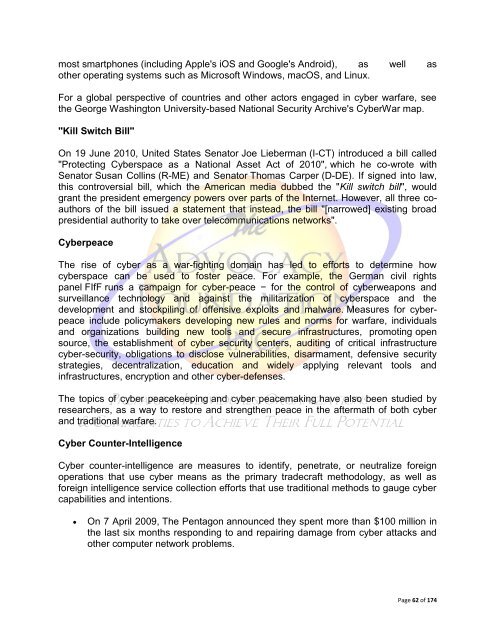International Cyber Terrorism
International Cyber Terrorism
International Cyber Terrorism
- No tags were found...
You also want an ePaper? Increase the reach of your titles
YUMPU automatically turns print PDFs into web optimized ePapers that Google loves.
most smartphones (including Apple's iOS and Google's Android), as well as<br />
other operating systems such as Microsoft Windows, macOS, and Linux.<br />
For a global perspective of countries and other actors engaged in cyber warfare, see<br />
the George Washington University-based National Security Archive's <strong>Cyber</strong>War map.<br />
"Kill Switch Bill"<br />
On 19 June 2010, United States Senator Joe Lieberman (I-CT) introduced a bill called<br />
"Protecting <strong>Cyber</strong>space as a National Asset Act of 2010", which he co-wrote with<br />
Senator Susan Collins (R-ME) and Senator Thomas Carper (D-DE). If signed into law,<br />
this controversial bill, which the American media dubbed the "Kill switch bill", would<br />
grant the president emergency powers over parts of the Internet. However, all three coauthors<br />
of the bill issued a statement that instead, the bill "[narrowed] existing broad<br />
presidential authority to take over telecommunications networks".<br />
<strong>Cyber</strong>peace<br />
The rise of cyber as a war-fighting domain has led to efforts to determine how<br />
cyberspace can be used to foster peace. For example, the German civil rights<br />
panel FIfF runs a campaign for cyber-peace − for the control of cyberweapons and<br />
surveillance technology and against the militarization of cyberspace and the<br />
development and stockpiling of offensive exploits and malware. Measures for cyberpeace<br />
include policymakers developing new rules and norms for warfare, individuals<br />
and organizations building new tools and secure infrastructures, promoting open<br />
source, the establishment of cyber security centers, auditing of critical infrastructure<br />
cyber-security, obligations to disclose vulnerabilities, disarmament, defensive security<br />
strategies, decentralization, education and widely applying relevant tools and<br />
infrastructures, encryption and other cyber-defenses.<br />
The topics of cyber peacekeeping and cyber peacemaking have also been studied by<br />
researchers, as a way to restore and strengthen peace in the aftermath of both cyber<br />
and traditional warfare.<br />
<strong>Cyber</strong> Counter-Intelligence<br />
<strong>Cyber</strong> counter-intelligence are measures to identify, penetrate, or neutralize foreign<br />
operations that use cyber means as the primary tradecraft methodology, as well as<br />
foreign intelligence service collection efforts that use traditional methods to gauge cyber<br />
capabilities and intentions.<br />
• On 7 April 2009, The Pentagon announced they spent more than $100 million in<br />
the last six months responding to and repairing damage from cyber attacks and<br />
other computer network problems.<br />
Page 62 of 174
















